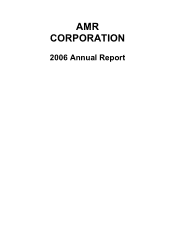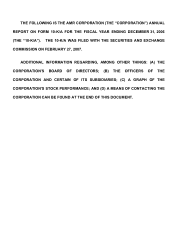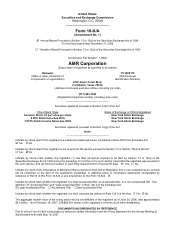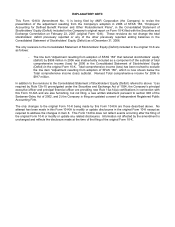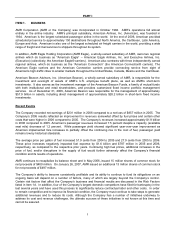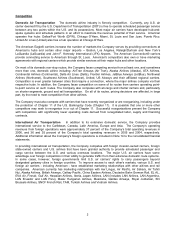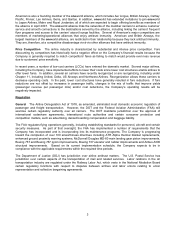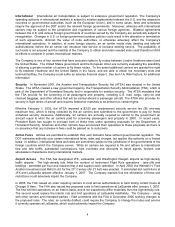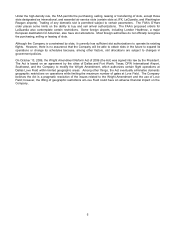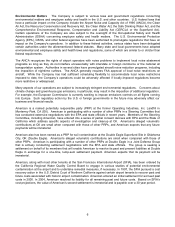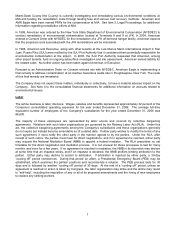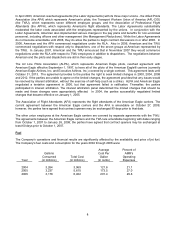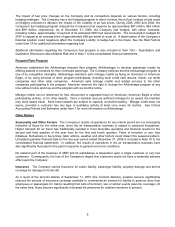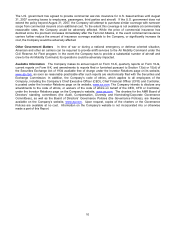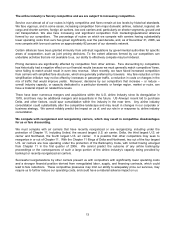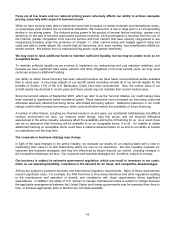American Airlines 2006 Annual Report Download - page 8
Download and view the complete annual report
Please find page 8 of the 2006 American Airlines annual report below. You can navigate through the pages in the report by either clicking on the pages listed below, or by using the keyword search tool below to find specific information within the annual report.4
International International air transportation is subject to extensive government regulation. The Company's
operating authority in international markets is subject to aviation agreements between the U.S. and the respective
countries or governmental authorities (such as the European Union), and in some cases, fares and schedules
require the approval of the DOT and/or the relevant foreign governments. Moreover, alliances with international
carriers may be subject to the jurisdiction and regulations of various foreign agencies. Bilateral agreements
between the U.S. and various foreign governments of countries served by the Company are periodically subject to
renegotiation. Changes in U.S. or foreign government aviation policies could result in the alteration or termination
of such agreements, diminish the value of route authorities, or otherwise adversely affect the Company's
international operations. In addition, at some foreign airports, an air carrier needs slots (landing and take-off
authorizations) before the air carrier can introduce new service or increase existing service. The availability of
such slots is not assured and the inability of the Company to obtain and retain needed slots could therefore inhibit
its efforts to compete in certain international markets.
The Company is one of four carriers that have exclusive rights to fly routes between London Heathrow airport and
the United States. The United States government and the European Union are currently evaluating the possibility
of allowing a greater number of carriers to fly these routes. To the extent additional carriers are granted the right
to fly between Heathrow and the United States in the future, and are able to obtain the necessary slots and
terminal facilities, the Company could suffer an adverse financial impact. See Item 1A, Risk Factors, for additional
information.
Security In November 2001, the Aviation and Transportation Security Act (ATSA) was enacted in the United
States. The ATSA created a new government agency, the Transportation Security Administration (TSA), which is
part of the Department of Homeland Security and is responsible for aviation security. The ATSA mandates that
the TSA provide for the screening of all passengers and property, including U.S. mail, cargo, carry-on and
checked baggage, and other articles that will be carried aboard a passenger aircraft. The ATSA also provides for
security in flight decks of aircraft and requires federal air marshals to be present on certain flights.
Effective February 1, 2002, the ATSA imposed a $2.50 per enplanement security service fee ($5 one-way
maximum fee), which is being collected by the air carriers and submitted to the government to pay for these
enhanced security measures. Additionally, air carriers are annually required to submit to the government an
amount equal to what the air carriers paid for screening passengers and property in 2000. In recent years,
President Bush has sought to increase both of these fees under spending proposals for the Department of
Homeland Security. American and other carriers have announced their opposition to these proposals as there is
no assurance that any increase in fees could be passed on to customers.
Airline Fares Airlines are permitted to establish their own domestic fares without governmental regulation. The
DOT maintains authority over certain international fares, rates and charges, but applies this authority on a limited
basis. In addition, international fares and rates are sometimes subject to the jurisdiction of the governments of the
foreign countries which the Company serves. While air carriers are required to file and adhere to international
fare and rate tariffs, substantial commissions, fare overrides and discounts to travel agents, brokers and
wholesalers characterize many international markets.
Airport Access The FAA has designated JFK, LaGuardia, and Washington Reagan airports as high-density
traffic airports. The high-density rule limits the number of Instrument Flight Rule operations - take-offs and
landings - permitted per hour and requires that a slot support each operation. In April 2000, the Wendell H. Ford
Aviation Investment and Reform Act for the 21
st
Century (Air 21 Act) was enacted. It eliminated slot restrictions at
JFK and LaGuardia airports effective January 1, 2007. The Company expects that the elimination of these slot
restrictions could adversely impact the Company.
In 2006, the FAA issued an order requiring carriers to hold arrival authorizations to land during certain hours at
Chicago O’Hare. The FAA also issued two proposed rules to limit operations at LaGuardia after January 1, 2007.
The first will limit operations on an interim basis, and is not expected to differ materially from the high-density rule.
The second would replace the interim rule and limit operations at LaGuardia indefinitely. The Company – along
with other carriers and interested parties – filed comments with the FAA in December 2006 seeking changes to
the proposed rules. The rules, as currently drafted, could require the Company to change the routes and service
it currently operates at LaGuardia, which could adversely impact the Company.

